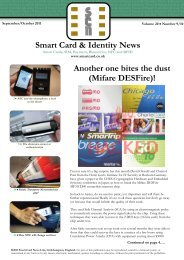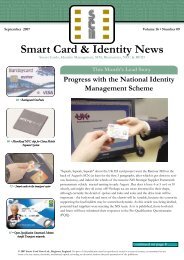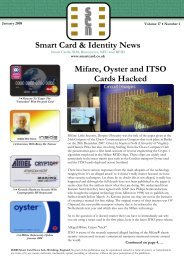Smart Card & Identity News A New Flavour for eCash
Smart Card & Identity News A New Flavour for eCash
Smart Card & Identity News A New Flavour for eCash
Create successful ePaper yourself
Turn your PDF publications into a flip-book with our unique Google optimized e-Paper software.
<strong>Smart</strong> <strong>Card</strong> & <strong>Identity</strong> <strong><strong>New</strong>s</strong><br />
Published monthly by<br />
<strong>Smart</strong> <strong>Card</strong> <strong><strong>New</strong>s</strong> Ltd<br />
Head Office: <strong>Smart</strong> <strong>Card</strong> Group,<br />
12 Meadway, Rustington,<br />
BN16 2DD<br />
Telephone: +44 (0)1903 734677<br />
Website: www.smartcard.co.uk<br />
Email: info@smartcard.co.uk<br />
Researcher– Patsy Editorial Everett<br />
Researcher – Patsy Everett<br />
Technical Researcher –<br />
Dr David Everett<br />
Production Team – John Owen,<br />
Lesley Dann, Adam Noyce<br />
Contributors to this Issue –<br />
Conie Mutters, Ian Hermon,<br />
Eli Hizkiyev, RBR<br />
Photographic Images –<br />
Dreamstime.com<br />
Printers – Hastings Printing Company<br />
Limited, UK<br />
ISSN – 1755-1021<br />
Disclaimer<br />
<strong>Smart</strong> <strong>Card</strong> <strong><strong>New</strong>s</strong> Ltd shall not be liable<br />
<strong>for</strong> inaccuracies in its published text.<br />
We would like to make it clear that<br />
views expressed in the articles are those<br />
of the individual authors and in no way<br />
reflect our views on a particular issue.<br />
All rights reserved. No part of this<br />
publication may be reproduced or<br />
transmitted in any <strong>for</strong>m or by any<br />
means – including photocopying –<br />
without prior written permission from<br />
<strong>Smart</strong> <strong>Card</strong> <strong><strong>New</strong>s</strong> Ltd.<br />
© <strong>Smart</strong> <strong>Card</strong> <strong><strong>New</strong>s</strong> Ltd<br />
<strong>Smart</strong> <strong>Card</strong> & <strong>Identity</strong> <strong><strong>New</strong>s</strong> • March 2012<br />
Patsy Everett<br />
Our Comments<br />
Dear Subscribers,<br />
Once more the annual Digital Money Forum<br />
clicked into life in London’s east end on the<br />
28/29th March. Mine host David Birch was his<br />
normal self, shaking the tree of established<br />
thinking to see if any interesting apples fall out.<br />
Of course they always do, it’s whether you<br />
notice it at the time!<br />
Anette Brolos from the Copenhagen Financial IT Region (CFIR) got<br />
the day rolling by discussing their project in Denmark that is looking<br />
at the future of money and their vision of a cashless society.<br />
Denmark of course was very early into the game with the Dankort<br />
(debit card) and Dancoin. Anette reminded us that cash costs about<br />
€26 Bn to manage in Europe and the impact that this has on<br />
business. As has been pointed out in our lead article this month the<br />
cost of cash is often hidden away because it’s not obvious who is<br />
paying the bill. But we know this, don’t we? But also there is the<br />
environmental burden, the impact of crime and isn’t money just plain<br />
filthy? We are always hearing about how much cocaine you can find<br />
on a standard used currency bill.<br />
However not to be put off Anette seems clear that one day there will<br />
be a cashless society (more or less) brought about by a number of<br />
scenarios of which social development will be a substantial element<br />
in our future. It goes without saying that technology will also have its<br />
say with mobile wallets, NFC, bar codes and the like. But Anette<br />
ended with a closing thought by telling us that according to a Danish<br />
national bank study, cash is four times more expensive to use than<br />
the Danish debit card (Dankort).<br />
Now here’s the thing, if this is true and we hear similar figures <strong>for</strong> the<br />
UK as well as the rest of Europe, who is promoting the continued<br />
use of cash?<br />
Of course everybody will tell you it is the criminals, organised crime<br />
and the like that need the anonymity and fluidity of cash to harvest<br />
their crimes. We might mention the grey economy (it just sounds<br />
better than black) which everybody seems to do that gets you a lower<br />
bill if you pay in cash or if you really don’t want people to know what<br />
you are doing and you really don’t want to be traced.<br />
I want to suggest that this is actually only a part of the story,<br />
behavioural economics comes into this in a bigger way than you<br />
might imagine. The truth is that people don’t like change. There is an<br />
old tale that tells you that promoting radical new ideas are at best<br />
ignored but in general are heavily criticised and resisted by those with<br />
established positions. Only a small number of people follow a vision<br />
and they are usually the ones closest to the evangelist. Sometimes this<br />
can of course create a church of followers and this was perhaps the<br />
greatest talent of Steve Jobs. If I’m right on this with the un<strong>for</strong>tunate<br />
demise of Steve, then Apple has reached its pinnacle and only has<br />
one way to go. You can do experiments in the laboratory to show<br />
that all of this is normal human behaviour.<br />
2
















